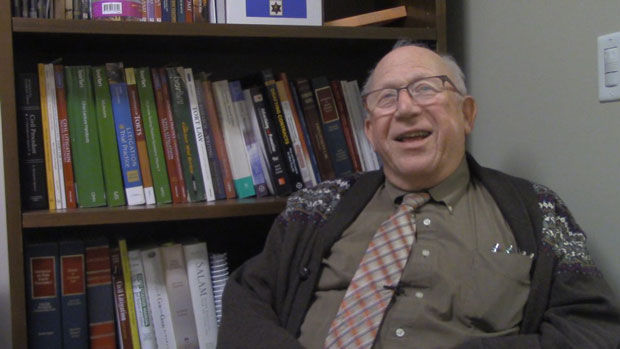KSU professor shares experiences as child Holocaust survivor
When students step inside Sol Factor’s classroom, they may be surprised to find out that he has two identities: instructor of Jewish History and abandoned child Holocaust survivor.
“It (his story) is truly inspirational,” said Marni Altman, freshman speech pathology and audiology major.
During the Holocaust, Factor, born Meier Pollack, separated from his natural mother at only two weeks old. Rosa Pollack gave birth to him at a women’s hospital in Munich, Germany in June 1946. Nazi soldiers imprisoned her at the Auschwitz concentration camp in Poland, according to Factor.
“It’s sort of interesting, I fall into a gray area between true child survivor, in other words a child that was living during the time of the Holocaust, so somewhere between 1933 and 1945, and what we call second generation, a child of survivors,” Factor said.
He journeyed to the U.S. as an unaccompanied child in 1947. He lived at a couple foster homes in Boston, until the Factor family adopted him in 1950. His family settled in Belmont, Massachusetts, a suburb near Cambridge, Factor said.
He said his adopted family provided a comfortable and stable childhood.
“The Holocaust shattered, not only children’s lives, but also young adults’ lives,” Factor said. “Some never fully recovered from it, which is very very sad. I had a very nice childhood.”
Factor said his family did not talk about his life prior to the adoption. He initially faced his past at age 18, after seeing his documentation for the first time during registration for the military draft. However, Factor did not formally begin the search for his birth family until he was in his 40s, he said.
“In 1990 is when I first really began to be interested to search, not so much for myself,” Factor said. “I have two children, two grown children married with children of their own, and I wanted at least to be able to tell them the story, and so I began.”
Factor uncovered more documents about his past with the help of a German exchange student’s mother between 2001 and 2002. The agency from Boston, who took care of Factor prior to his adoption, also came forward with original documentation in 2007.
“Some of the documentation, actually, is very funny,” Factor said. “One document, for example, says that I was not a pretty baby, talk about an ego-deflator.”
The Tracing Services at Israel Magen David Adom, which help relatives connect with Holocaust descendants, finally found Factor’s mother living in Israel; however, she chose not to meet with him. The tracing department informed Factor his mother died in January 2014. She never married or had any other children, Factor said.
He said his past and adoptive mother inspired his decision to become an educator. Factor attended Nasson College in Maine and John Carroll University in Cleveland, where he received his Master of Arts in Teaching.
“I came from an experience where my mother, when I say my mother of course obviously it’s my adoptive mother, never knew the other one, was an early childhood educator, and basically knew from the time I was in high school that there was a good chance that I would go into teaching,” Factor said.
He taught public school for 37 years and began teaching at Kent State in 2006. Factor educates students on the importance of Holocaust remembrance and survivor experience.
“They (students) have to get used to my crazy sense of humor and whatnot, but we usually do pretty well,” Factor said.
Factor enjoys engaging with his students on a more personal level. He prefers the intimacy of smaller classes to share his personal story, he said.
“Sol is an extremely qualified and engaging professor,” said Sophia Witt, junior communication studies major. “I have had the pleasure of having him as a professor as well as a guest speaker. He has taught us the fundamentals of Judaism, as well as his amazing story of Holocaust survival. If given the opportunity, I would take professor Factor in a heartbeat. His liveliness makes his classroom and teaching very comfortable.”



